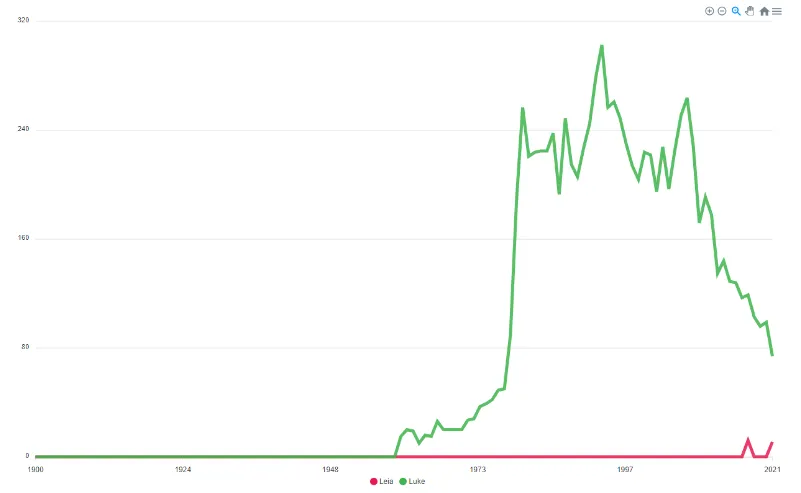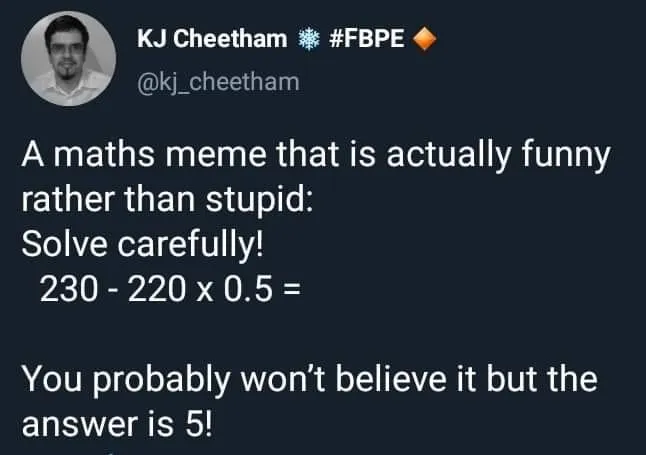People say nothing is impossible
Mark Honeychurch - 1st August 2022
But I do nothing every day
Several years ago at a Skeptics in the Pub meeting, maybe back in 2014 or 2015, we got onto the topic of the popularity of baby names. At the time, someone predicted that there were likely to be sudden increases in usage for names that had become well known through popular media, especially names that are either rarely used or fictional. Their examples to illustrate the idea were Luke and Leia, from Star Wars, with the prediction that these names would spike at some point after 1977, the release year of the first Star Wars movie.
As a skeptic, I’d always had in mind to check out this idea, and test if it was true - but it was only recently that I finally got round to doing something about it. It turns out that the Department of Internal Affairs releases data on the number of times each name is given to a baby each year, with the limitation being that, for anonymity reasons, any name that is used fewer than 10 times in a year is not included in the data.
As a web developer, it made sense for me to make a website that would display the data in a way that was easy to access. So, last week over a couple of evenings I built a site that would display this data as lists and graphs. And the first names I checked out were Luke and Leia:

And there we have it - a sudden spike in use of the name Luke, starting in 1978. Interestingly, use of Leia as a name first rises above the threshold of 10 babies in 2017 - the year of the release of the movie The Last Jedi.
For now my site is at https://names.honeychurch.org - feel free to have a play around, although things may be a little broken in places until I get round to fixing them. I may buy a domain name for this once I’ve fixed the outstanding issues and added some more features. For me the site has served its purpose, as I now know that names like Juno, Leonidas and Kylo do indeed become more popular after they are used in movies. But maybe this site will also be useful for someone looking for a name for their baby - it’s pretty easy to use the site to see whether a name is increasing in popularity (like Quinn), or is rapidly going out of fashion (like Karen).
Speaking of maths, via committee member Brad MacClure on Facebook here’s a fun little piece of maths geekery:

For those who didn’t spot it, the joke here is that, because of a sneaky exclamation mark, the maths works no matter what the operator precedence is. So even if you think that correct operator precedence means the answer is wrong, it’s still right:
- (230 - 220) x 0.5 = 10 x 0.5 = 5
- 230 - (220 x 0.5) = 230 - 110 = 120 = 5! (5 factorial, or 5 x 4 x 3 x 2 x 1)
In this week’s newsletter, we start off with a little maths from an email I received from kiwi David Porter in Ireland, as a response to my last newsletter. He was interested in the claim I’d heard at a QAnon meeting about the Three Waters initiative being a ploy to send our water overseas via container ships, so he did some maths to see just how silly it all is.
I’ve recently been watching a pretty awful neo Nazi documentary series that’s doing the rounds in NZ, and so you’ll all have to suffer with me a little as I look into just one claim in the show - that Churchill was too drunk to deliver his speeches on the radio, and used the Winnie the Pooh voice actor to do it for him.
There was an article on Vice recently about the issue of psychics and tarot card readers being the target of scams online. I think there’s a large dollop of irony to this one, given that these are people who are claiming to have magical abilities and taking people’s money in return for lying about what’s in their future, so I’ve picked out some choice quotes that seem to show a failure of these people to grasp the concept that they’re as guilty as the scammers.
As promised by Bronwyn last week, and following on from her great article about Mensa, I’ve chosen to focus on the bizarre side of high IQ societies and made some interesting findings - with a curious connection to New Zealand.
Now, to paraphrase Winnie the Pooh author A.A. Milne, “perhaps the best thing to do is to stop writing this introduction and get on with the newsletter”.